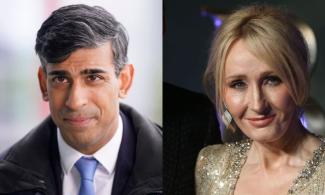
The Harry Potter author described several transgender women as men, including convicted prisoners, trans activists and other public figures.
Social media comments made by JK Rowling challenging Scotland's new hate crime law are not being treated as criminal, Police Scotland has said.
The Harry Potter author described several transgender women as men, including convicted prisoners, trans activists and other public figures.
The new law creates a new crime of "stirring up hatred" relating to protected characteristics.
According to the BBC, the force said complaints had been received but no action would be taken.
Reacting to the news, Ms Rowling posted on X: "I hope every woman in Scotland who wishes to speak up for the reality and importance of biological sex will be reassured by this announcement, and I trust that all women - irrespective of profile or financial means - will be treated equally under the law.
"If they go after any woman for simply calling a man a man, I'll repeat that woman's words and they can charge us both at once."
The Hate Crime and Public Order (Scotland) Act 2021, which came into effect on Monday, makes it a criminal offence to make derogatory comments based on disability, religion, sexual orientation, transgender identity or being intersex.
Stirring up hatred based on race, colour, nationality or ethnicity was already illegal in Great Britain under the Public Order Act 1986 but is now included in the new law.
Prime Minister Rishi Sunak earlier backed Ms Rowling's stance stating the UK had a proud tradition of free speech.
Mr Sunak would not be drawn on whether he supported her approach, saying that it was "not right for me to comment on police matters, individual matters".
But he added: "We should not be criminalising people saying common sense things about biological sex, clearly that isn't right.
"We have a proud tradition of free speech."
Scotland's First Minister Humza Yousaf said racist graffiti, which appeared near his home, is a reminder of why Scotland must take a "zero-tolerance" approach to hate crime.
He said the law was designed to deal with what he called a "rising tide of hatred" in society.
A spokesperson for the first minister said: "The prime minister's comments ignore the fact that the right to freedom of expression is built into the Act and that it also has a high threshold for criminality.
"The legislation does not prevent people expressing controversial, challenging or offensive views, nor does it seek to stifle criticism or rigorous debate in any way."
The law states that it is a defence for a person charged with stirring up hatred to show that their actions were "reasonable."
It also references the right to freedom of expression in the European Convention on Human Rights, which includes protection for "ideas that offend, shock or disturb."
At the heart of Ms Rowling's criticism of the hate crime law is the fact that it does not include biological sex as a protected characteristic.
The Scottish government points out that it is planning a separate law to tackle hatred and harassment of women which it says will be introduced at Holyrood by the end of the parliamentary term in 2026.
Susan Smith of For Women Scotland, which campaigned against recent proposed changes to gender law, told the BBC's Newscast podcast that it was "a great relief but it's only happened because she pushed it".
"Now hopefully anybody else who says something similar will know that they are protected," added Ms Smith.